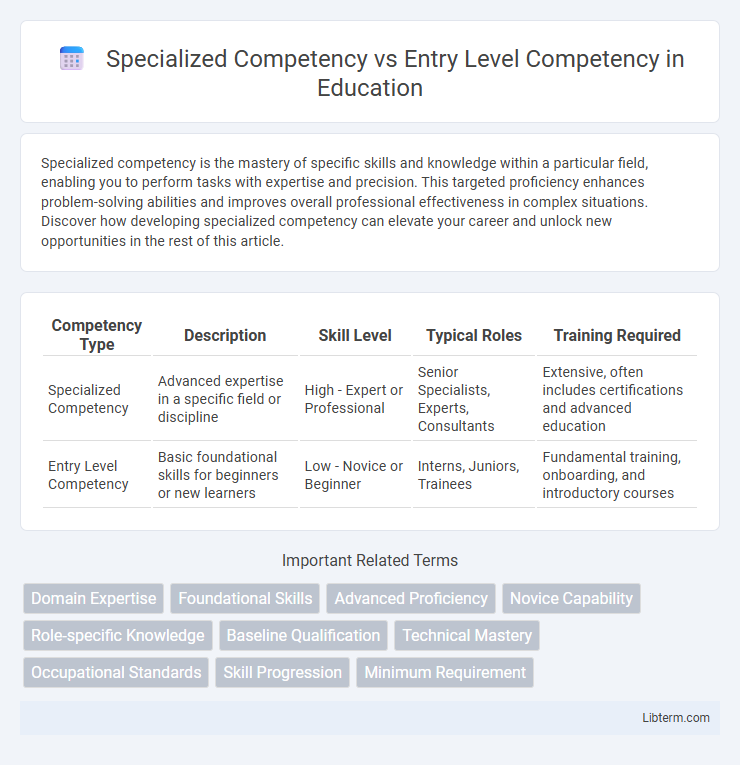Specialized competency is the mastery of specific skills and knowledge within a particular field, enabling you to perform tasks with expertise and precision. This targeted proficiency enhances problem-solving abilities and improves overall professional effectiveness in complex situations. Discover how developing specialized competency can elevate your career and unlock new opportunities in the rest of this article.
Table of Comparison
| Competency Type | Description | Skill Level | Typical Roles | Training Required |
|---|---|---|---|---|
| Specialized Competency | Advanced expertise in a specific field or discipline | High - Expert or Professional | Senior Specialists, Experts, Consultants | Extensive, often includes certifications and advanced education |
| Entry Level Competency | Basic foundational skills for beginners or new learners | Low - Novice or Beginner | Interns, Juniors, Trainees | Fundamental training, onboarding, and introductory courses |
Defining Specialized Competency
Specialized competency refers to advanced skills and in-depth knowledge required to perform complex tasks within a specific professional domain, surpassing the foundational abilities expected at the entry level. It involves expertise in specialized tools, methodologies, or technologies that enable greater efficiency, innovation, and problem-solving in specialized roles. Developing specialized competency often requires targeted training, certifications, and practical experience beyond the general competencies acquired during entry-level stages.
Understanding Entry Level Competency
Entry Level Competency refers to foundational skills and knowledge necessary for new professionals to perform basic job tasks effectively. It emphasizes core abilities such as communication, problem-solving, and understanding fundamental industry concepts. Strong mastery of Entry Level Competency ensures a solid starting point for career growth before advancing to Specialized Competency, which involves deeper expertise and technical proficiency.
Key Differences Between Specialized and Entry Level Skills
Specialized competency involves advanced knowledge and skills tailored to specific industries or roles, often requiring certification or extensive experience, whereas entry level competency covers fundamental skills necessary for basic job functions and workplace integration. Key differences include the depth of expertise, complexity of tasks handled, and the degree of independent decision-making expected. Employers typically seek specialized competencies for roles demanding technical proficiency and problem-solving, while entry level competencies are aligned with learning potential and adaptability in new environments.
Importance of Specialized Competencies in the Workforce
Specialized competencies are critical in the workforce, driving innovation and enabling employees to solve complex problems through advanced knowledge and skills specific to their field. These competencies differentiate professionals from entry-level workers by enhancing productivity, quality, and competitive advantage for businesses. Investing in specialized skill development supports career growth and aligns workforce capabilities with evolving industry demands.
Role of Entry Level Competencies in Career Foundation
Entry Level Competencies establish the foundational skills and knowledge necessary for professional growth, enabling individuals to perform basic job functions effectively. These competencies serve as critical building blocks for developing Specialized Competencies, which require advanced expertise and experience in specific domains. Mastery of Entry Level Competencies ensures a solid career foundation, facilitating progression into complex roles and specialized fields within an organization.
Industry Examples of Specialized vs Entry Level Competencies
Specialized competencies, such as advanced data analysis in finance or machine learning expertise in tech, require in-depth knowledge and practical experience beyond entry-level skills like basic Excel proficiency or fundamental coding. Entry-level competencies often include foundational abilities like customer service or general administrative tasks, while specialized roles demand proficiency in industry-specific tools, for instance, CAD software for engineering or compliance regulations in healthcare. Companies like Deloitte seek entry-level competencies in auditing techniques, but require specialized skills in forensic accounting for senior roles, illustrating the distinction across industries.
How to Transition from Entry Level to Specialized Competency
Transitioning from entry-level to specialized competency requires focused skill development in specific industry tools, advanced techniques, and deep domain knowledge. Leveraging mentorship opportunities, targeted training programs, and real-world project experience accelerates proficiency and industry relevance. Consistent performance assessments and certification acquisition validate skills, ensuring readiness for specialized roles.
Assessment Methods for Competency Levels
Assessment methods for specialized competency often involve advanced simulations, case studies, and project-based evaluations that measure deep expertise and the ability to apply knowledge in complex scenarios. Entry-level competency assessments typically rely on standardized tests, basic practical exercises, and direct observation to verify foundational skills and understanding. Both levels require tailored evaluation strategies to accurately gauge proficiency according to the distinct demands of each competency stage.
Impact on Professional Development and Advancement
Specialized competency demonstrates advanced skills and knowledge that drive higher productivity and innovation, significantly enhancing professional development by positioning individuals as experts within their field. Entry level competency provides foundational abilities essential for initial job performance and a baseline for growth, fostering confidence and readiness for more complex challenges. The progression from entry level to specialized competency directly correlates with increased opportunities for career advancement, leadership roles, and higher compensation.
Strategies for Building Specialized Competencies
Building specialized competencies requires targeted training programs that concentrate on advanced skills and industry-specific knowledge. Implementing mentorship initiatives with experts accelerates proficiency by providing real-world insights and practical experience. Utilizing technology-based learning platforms enables continuous skill development, adapting to evolving industry standards for specialized roles.
Specialized Competency Infographic

 libterm.com
libterm.com